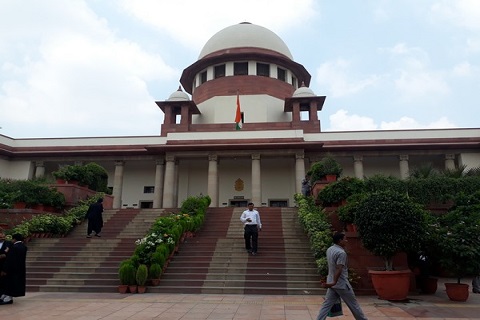Sometimes silence is good, there were problems from both sides: SC

- Country:
- India
The Supreme Court said on Friday that there were problems from both sides and the strike by lawyers to protest against the clash at a Delhi court last week was not the solution to deal with such instances. "Sometimes our silence is good enough. It is better if we don't say anything," the court said."There were problems on both sides. Nobody can clap with one hand. We should not speak much on the issue."
A bench of Justices Sanjay Kishan Kaul and K M Joseph made the remark that came after Bar Council of India (BCI) chairman Manan Kumar Mishra said the situation at the Tis Hazari court aggravated after the police's "brutality" on lawyers. The apex court was critical of the lawyers' strikes that are affecting judicial work in the high courts and trial courts, saying there were even weird reasons like temperature touching 45 degrees Celsius when advocates abstain from work.
A parking dispute between an on-duty policeman and a lawyer triggered the clash between the two sides at the Tis Hazari court complex last Saturday, leaving 20 security personnel and several advocates injured. Lawyers in all six district courts in Delhi have stayed away from work ever since to protest against the clash. The top court said the strike by the lawyers was not the solution to deal with such instances and there were other legal remedies available.
The BCI assured the top court that the situation in the Delhi district courts would return to normalcy that in a day or two. The bench was hearing a case pertaining to a lawyers' strike in the Orissa High Court and trial courts over the appointment of judges. It had sought the assistance of Attorney General K K Venugopal, BCI, high court bar association and the Bar Council of Odisha on the issue.
The top court also showed concern over the delay in accepting the recommendations of the collegium for appointment of judges in the high courts. It told the attorney general that the delay had also been one of the grievances of the lawyers, often resulting in agitation and strikes. The court said there should be a time frame within which the government should clear the recommendations of the collegium.
The bench was of the view that the high courts should start the process of filling up the vacancy six months before the actual vacancy arises. Venugopal said it would be better if the apex court collegium, in consultation with Union Law Ministry, frames suitable guidelines to avoid frequent delays in the appointment of judges for high courts.
The bench, however, asked the attorney general to convey the view of the court to the competent authority. Senior advocate Vikas Singh, appearing for the Bar Council of Odisha, agreed that the shortage of judges at the high courts had been one of the grievances and it would be appropriate if the court fixes a time frame for the government to accept the collegium's recommendation.
The top court asked the BCI chairman to proceed further with the resolution passed by the council on October 26, in which it directed the Odisha lawyers to call off their strikes and resume work or appropriate actions would be taken. It listed the matter for further hearing on December 6 and asked Mishra to apprise it about the status of lawyers strikes in various courts of the country.
(This story has not been edited by Devdiscourse staff and is auto-generated from a syndicated feed.)
ALSO READ
Abortion Rights Advocates Call for Decriminalization in Germany within First 12 Weeks of Pregnancy
CJI DY Chandrachud advocates for ethical AI integration in legal research
House Speaker Mike Johnson advocates for foreign aid package to support Israel, Ukraine, and Taiwan
Chhatrapati Shahu advocates for the protection of the Constitution as Cong makes natural choice for poll debut
Paris Hilton advocates for transparency in California's youth treatment facilities










